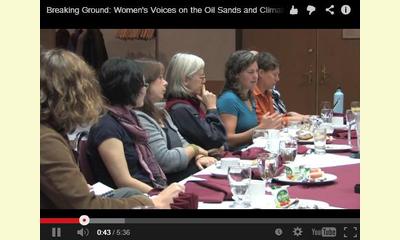|
|
Breaking Ground: New Report from the Nobel Women’s Initiative (Canada)
un articulo por Nobel Women's Initiative
Video: Women's Voices on the Oil Sands
In October 2012, Nobel Peace Laureate Jody
Williams led the Nobel Women’s Initiative fact
finding mission to Alberta’s tar sands and along
the proposed route of the Northern Gateway
Pipeline in British Columbia. Along the way, we
met with over 200 women in 13 communities who are
directly impacted by expansion of the tar sands.

Scene from the video
click on photo to enlarge
Now, we are very excited to present to you our
report detailing our findings from the delegation,
Breaking Ground: Women, Oil and Climate
Change in Alberta and British Columbia.
The tar sands is the fastest-growing single source
of greenhouse gas emissions in Canada. So far,
mining has damaged over 680 square kilometers of
land in the region—and pipeline construction has
cut through thousands of kilometers of pristine
forest and polluted streams and lakes.
We found that women are voicing their concerns
about a range of economic, health, and social
impacts of the tar sands expansions—from
homelessness, spiraling inflation, breathing
problems, undrinkable water, and increased cancer
rates to domestic violence and unequal access to
jobs.
“Women are frustrated that very real concerns about
potential oils spills, their families health and
well-being—as well as climate change—are being
ignored. So they are organizing and demanding to be
heard,” said Nobel Peace Laureate Jody Williams.
Watch this video
from the delegation and hear from some of the
women we met with in Alberta and British Columbia in
their own words.
Note: Thank you to Janet Hudgins, the CPNN reporter
for this article.]
|








|
DISCUSSION
Pregunta(s) relacionada(s) al artículo :
Despite the vested interests of companies and governments, Can we make progress toward sustainable development?
* * * * *
Comentario más reciente:
:
[responding to CPNN article The film 'Demain', a manifesto?
Yes initiatives from the grassroots are important and necessary which will have a direct impact on the present and the future. But there are governments like India which are conscious of over exploitation of the earth’s resources and are taking suitable policy measures and also taking legal action against the exploiters.
We must emphasize public transportation and reduce our dependence on individual cars even though the auto industry will not like this.
Otherwise it is not demain but aujourdhui — the problems are there for us to see.

|
|









